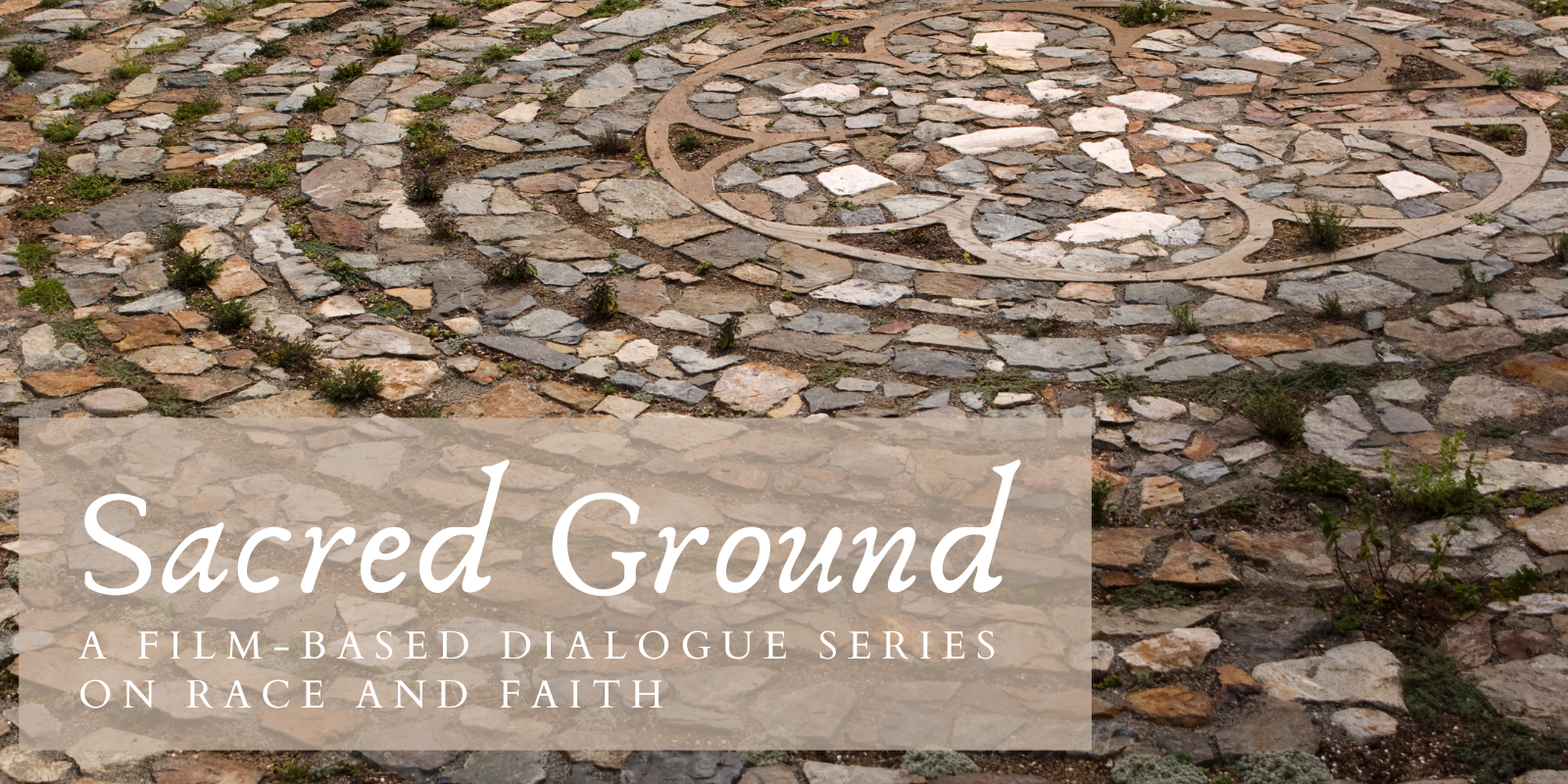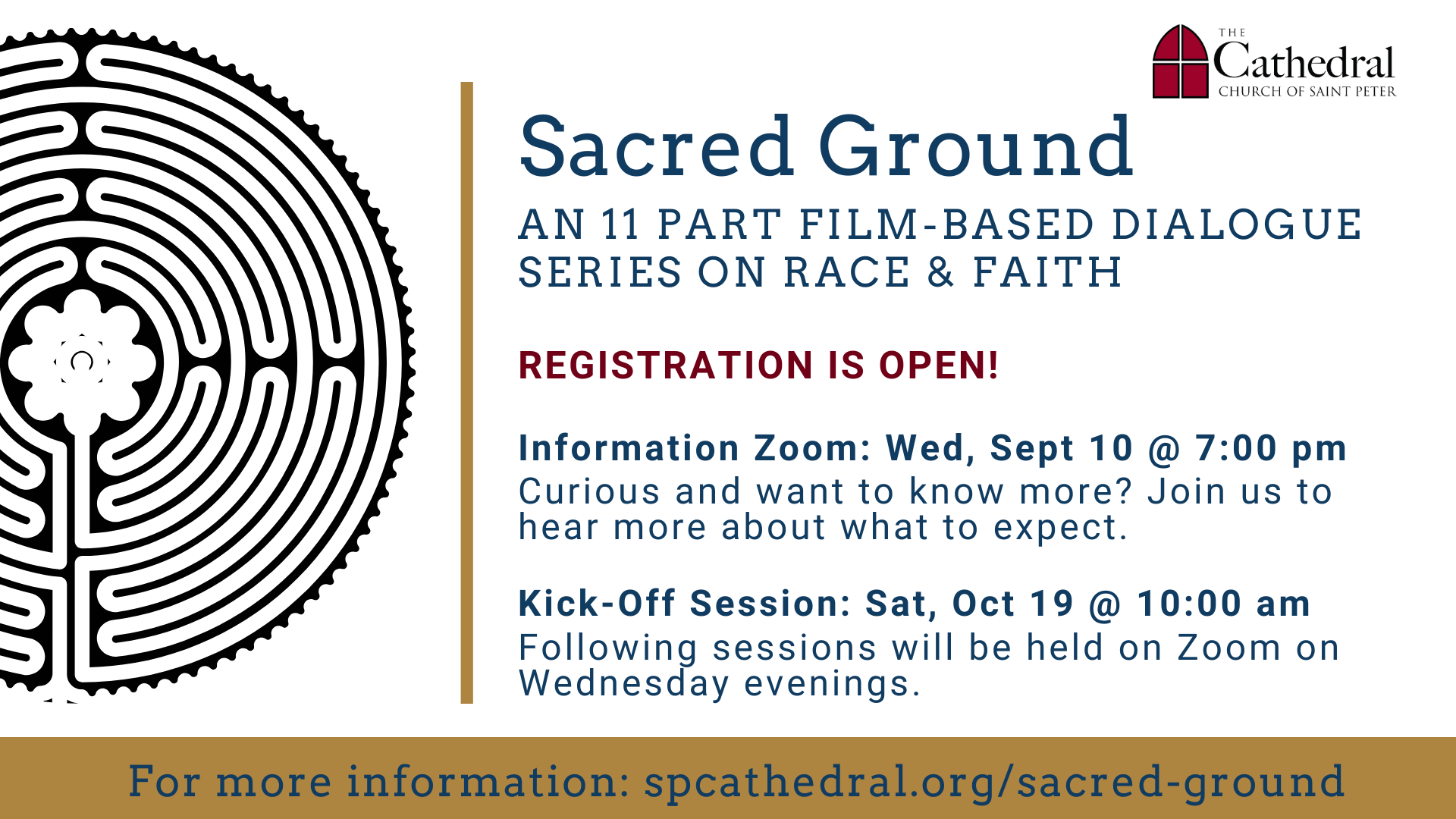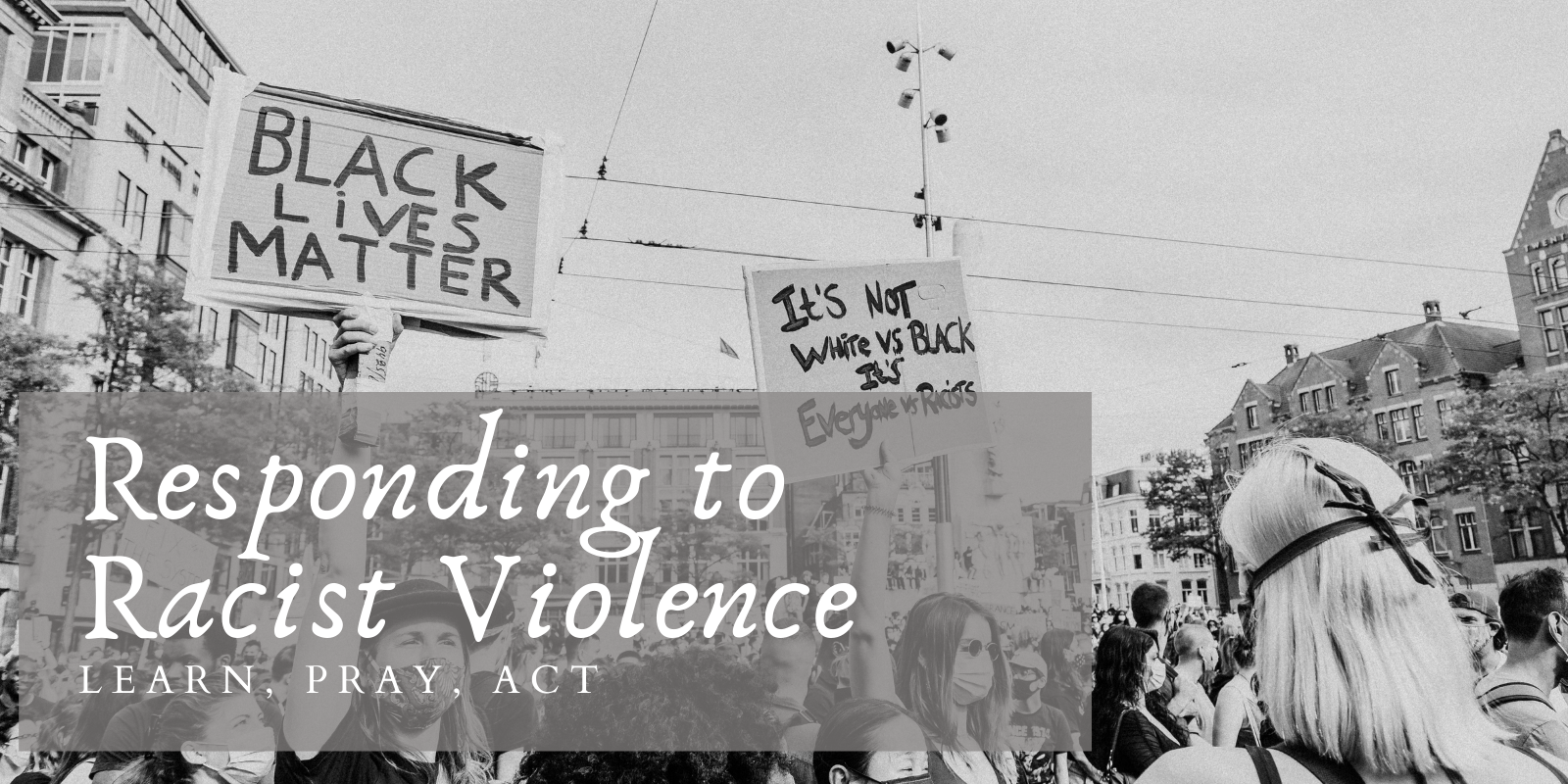Becoming Beloved Community
Join us on a journey to build Beloved Community in St. Petersburg.
Interested in being part of a thoughtful, collaborative group working to plan events and opportunities to engage in the work of learning and reconciliation?
The Beloved Community Group meets the second Thursday of the month at 1:00 pm.
Reach out to learn more and join us!
Fall Beloved Community Events
Questions? Please contact Betsy Adams, BBC Chair.
Sacred Ground, a program to foster racial healing and reconciliation, will return to the Cathedral on October 19. Sacred Ground is a film-based dialogue series on race, grounded in faith. Small groups are invited to walk through chapters of America’s history of race and racism, while weaving the threads of family story, economic class, and political and regional identity. Meeting dates and times will be determined by the participants.
The 11-part series is built around a powerful online curriculum of documentary films and readings that focus on Indigenous, Black, Latino, and Asian/ Pacific American histories as they intersect with European-American histories. Sacred Ground is part of Becoming Beloved Community, the Episcopal Church’s long-term commitment to racial healing, reconciliation, and justice in our personal lives, our ministries, and our society. The series is open to all, and is especially designed to help white people talk to other white people. Participants are invited to peel away the layers that have contributed to the challenges and divides of our present day — all while grounded in our call to faith, hope, and love.
For more information, contact Betsy Adams.
Sacred Ground is an attempt to respond to the profound challenges in our society around race and racism, as well as the difficult but respectful and transformative dialogue we need to have with each other about them. It invites participants to walk back through history in order to peel away the layers that brought us to today, and to do so in a personal way.
There is no charge. All are welcome, whether you are well-versed in these issues or are just beginning the journey.
Pilgrims Share Their Experiences on the Civil Rights Pilgrimage
On Sunday, June 9 pilgrims shared their experiences of their time in Montgomery and Selma in April 2024. You can view the presentation, slideshow, and the magazine created by Sarah Lewis.
Recommended Reading
These are a few books members of the BBC team have read and highly recommend. Have other favorites or recommendations? Let us know! Additional titles are listed below.
In her work as Executive Director of the Absalom Jones Center for Racial Healing, Meeks has fought tirelessly to shed light on racism and provide tools and experiences to enable faith communities to work to combat it. In this new book, she shares highlights and insights from her journey and offers a much-needed meditative guide for the weary and frustrated. By looking inward and at each other clearly, she argues, good people of all backgrounds can forge a long term and individual path to making a difference. With personal stories and thoughtful direction, she takes the reader on the trajectory from self-awareness to recognition of the past to a new and individual way forward.
Meditation topics include how to work through fear and rage, how stories can help heal, honoring your ancestors while looking toward the future, what it really means to love one another and the meaning of social justice.
McGhee embarks on a deeply personal journey across the country from Maine to Mississippi to California, tallying what we lose when we buy into the zero-sum paradigm—the idea that progress for some of us must come at the expense of others. Along the way, she meets white people who confide in her about losing their homes, their dreams, and their shot at better jobs to the toxic mix of American racism and greed. This is the story of how public goods in this country—from parks and pools to functioning schools—have become private luxuries; of how unions collapsed, wages stagnated, and inequality increased; and of how this country, unique among the world’s advanced economies, has thwarted universal healthcare.
The Sum of Us is not only a brilliant analysis of how we arrived here but also a heartfelt message, delivered with startling empathy, from a black woman to a multiracial America. It leaves us with a new vision for a future in which we finally realize that life can be more than a zero-sum game.
In this powerful memoir, Charles Dew, one of America’s most respected historians of the South--and particularly its history of slavery--turns the focus on his own life, which began not in the halls of enlightenment but in a society unequivocally committed to segregation.
Dew’s wish with this book is to show how the South of his childhood came into being, poisoning the minds even of honorable people, and to answer the question put to him by Illinois Browning Culver, the African American woman who devoted decades of her life to serving his family: "Charles, why do the grown-ups put so much hate in the children?"
Peabody Award–winning journalist Michele Norris offers a transformative dialogue on race and identity in America, unearthed through her decade-long work at The Race Card Project.
The prompt seemed simple: Race. Your Thoughts. Six Words. Please Send.
The answers, though, have been challenging and complicated. In the twelve years since award-winning journalist Michele Norris first posed that question, over half a million people have submitted their stories to The Race Card Project inbox. The stories are shocking in their depth and candor, spanning the full spectrum of race, ethnicity, identity, and class.
For six decades John Robert Lewis (1940–2020) was a towering figure in the U.S. struggle for civil rights. As an activist and progressive congressman, he was renowned for his unshakable integrity, indomitable courage, and determination to get into “good trouble.”
In this first book-length biography of Lewis, Raymond Arsenault traces Lewis’s upbringing in rural Alabama, his activism as a Freedom Rider and leader of the Student Nonviolent Coordinating Committee, his championing of voting rights and anti-poverty initiatives, and his decades of service as the “conscience of Congress.”
In this beautifully written masterwork, the Pulitzer Prize–winnner and bestselling author of Caste chronicles one of the great untold stories of American history: the decades-long migration of black citizens who fled the South for northern and western cities, in search of a better life.
“Profound, necessary and an absolute delight to read.” —Toni Morrison
From 1915 to 1970, this exodus of almost six million people changed the face of America. Wilkerson compares this epic migration to the migrations of other peoples in history. She interviewed more than a thousand people, and gained access to new data and official records, to write this definitive and vividly dramatic account of how these American journeys unfolded, altering our cities, our country, and ourselves.
Local Resources and Events
The African American Heritage Trails in St. Petersburg
The African American Heritage Trails in St. Petersburg, Florida, are walking tours of downtown neighborhoods. They provide individuals, groups, and classes with an overview of African American influence on the history of the city. Nineteen markers covering more than a dozen city blocks provide details about the history of the African American community in St. Petersburg.
Dr. G. Carter Woodson African American Museum
The museum presents the historic voice of one segment of the St. Petersburg Florida community in the perspective of local, regional, and national history, culture and community. It is another demonstration of the commitment to revitalize the Midtown St. Petersburg area.
The Union of Black Episcopalians
The Union of Black Episcopalians stands in the continuing tradition of more than 200 years of Black leadership in the Episcopal Church. The Union of Black Episcopalians is a confederation of more than 55 chapters and interest groups throughout the continental United States and the Caribbean. The Union also has members in Canada, Africa and Latin America.
The NAACP
The mission of the National Association for the Advancement of Colored People (NAACP) is to secure the political, educational, social, and economic equality of rights in order to eliminate race-based discrimination and ensure the health and well-being of all persons.
Past Events and Recordings
The Making of a Racist with Charles B. Dew
A native of St. Petersburg, Charles B. Dew will speak about his memoir, “The Making of a Racist: A Southerner Reflects on Family, History, and the Slave Trade.” He describes growing up in St. Petersburg during the Jim Crow era, and how he realized that he had been thoroughly indoctrinated into thinking that that was "just the way things were."
African-American Communities with Ray Arsenault
Noted Civil Rights historian Ray Arsenault will join us for a webinar discussion about the history of the African-American communities in St. Petersburg.
Resources from the Episcopal church
We acknowledge this is hard work.
We are asking ourselves and each other to reexamine stories and truths that are deeply held. We also acknowledge that we are called by God and our baptismal vows to do this work. We approach this work with a sense of curiosity and understanding that we don’t have all the answers and are sometimes limited by own own life experiences. Below are links to books, articles, films, and online resources to help us learn and reflect as preparation for wider discussion.












